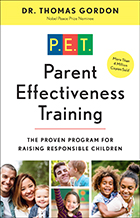 A belief commonly held by both laypeople and professionals is that children actually want authority—they like parents to restrict their behavior by setting limits. When parents use their authority, so the argument goes, children feel more secure. Without limits, they not only will be wild and undisciplined but also insecure. An extension of this belief is that if parents do not use authority to set limits, their children will feel the parents do not care and will feel unloved.
A belief commonly held by both laypeople and professionals is that children actually want authority—they like parents to restrict their behavior by setting limits. When parents use their authority, so the argument goes, children feel more secure. Without limits, they not only will be wild and undisciplined but also insecure. An extension of this belief is that if parents do not use authority to set limits, their children will feel the parents do not care and will feel unloved.
While I suspect this belief is embraced by many because it gives them a neat justification for using power, I do not want to discredit the belief as a mere rationalization. There is some truth in the belief and so it must be examined rather carefully.
Common sense and experience strongly support the idea that children do want limits in their relationship with parents. They need to know how far they can go before their behavior will be unacceptable. Only then can they choose not to engage in such behaviors. This applies to all human relationships.
For example, I am much more secure when I know which of my behaviors are unacceptable to my wife. One that comes to mind is playing golf or going to my office to work on a day when we entertain guests. By knowing ahead of time that my absence will be unacceptable because my wife needs my help, I can choose not to play golf or go to the office and avoid her displeasure or anger and probably a conflict.
However, it is one thing for a child to want to know the “limits of her parents’ acceptance” and an entirely different thing to say that she wants her parent to set those limits on her behavior. To return to the example involving my wife and me: I am helped when I know her feelings about my playing golf or going to the office on days we entertain. But I certainly will bristle and be resentful if she tries to set a limit on my behavior by some such statement as, “I cannot permit you to play golf or go to the office on days we are having guests. That’s a limit. You are not to do those things.”
I would not appreciate this power approach at all. It is ridiculous to suppose that my wife would even try to control and direct my behavior this way. Children respond no differently to limit setting on the part of the parent. Equally strong is their bristling and resentment when a parent unilaterally tries to set a limit on their behavior. I have never known a child who wants a parent to set a limit on her behavior like this:
“You have to be in by midnight—no excuses.”
“I will not let you take the car.”
“You can’t play with your truck in the living room.”
“We forbid you to smoke pot.”
“There’s no way that you’re going out with that boy.”
The reader will recognize all these communications as our familiar “sending the solution” (also, all are You-Messages). A much sounder principle than “children want their parents to use their authority and set limits” is the following:
Children want and need information from their parents that will tell them the parents’ feelings about their behavior, so that they themselves can modify behavior that might be unacceptable to the parents. However, children do not want the parent to try to limit or modify their behavior by using or threatening to use their authority. In short, children want to limit their behavior themselves if it becomes apparent to them that their behavior must be limited or modified. Children, like adults, prefer to be their own authority over their behavior.
One further point: children actually would prefer that all their behavior were acceptable to their parents, so that it would be unnecessary to limit or modify any of their behavior. I, too, would prefer that my wife would find all my behavior unconditionally acceptable. That’s what I would prefer, but I know it is not only unrealistic, but impossible.
prefer that my wife would find all my behavior unconditionally acceptable. That’s what I would prefer, but I know it is not only unrealistic, but impossible.
So parents should not expect, nor will their children expect of them, that they will be accepting of all behavior. What children have a right to expect, however, is that they always be told when their parents are not feeling accepting of a certain behavior (“I don’t like to be tugged and pulled when I’m talking to a friend”). This is quite different from wanting parents to use authority to set limits on their behavior.
(This was excerpted from Dr. Gordon’s Parent Effectiveness Training book, 1970, 2000, 2019.)

